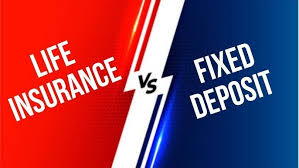When it comes to securing your financial future, two popular options often come to mind: FD vs life insurance. Both serve different purposes and offer unique benefits. In this article, we’ll dive deep into the world of FDs and Life Insurance. This will help you understand their key differences and determine which one aligns better with your financial goals. By the end, you’ll have a clearer picture of how these instruments can contribute to your financial security.
Get high ROI with 8.8% on Fixed Deposits. Invest today
Understanding Fixed Deposits
What Makes FDs Unique?
Fixed Deposits are a low-risk investment option offered by banks and financial institutions like Airtel Finance. They provide a fixed interest rate for a predetermined tenure. This makes them an ideal choice for those seeking guaranteed returns and capital preservation. Unlike market-linked investments, FDs are not affected by market fluctuations, ensuring stable and predictable growth of your money.
Breaking Down FD Charges
When investing in an FD, it’s essential to understand the associated charges. Generally, FDs have minimal charges compared to other investment options. However, premature withdrawal of your deposit may attract a penalty. This varies depending on the bank and the tenure of your FD. It’s always wise to read the fine print and understand the charges before investing.
Calculating Your FD Returns
One of the most attractive features of FDs is the ability to calculate your returns in advance. Suppose you invest ₹1 lakh in a 3-year FD with a 6.5% annual interest rate. Using an FD interest calculator, you can easily determine that your maturity amount will be approximately ₹1,20,875. This predictability allows you to plan your finances effectively.
FDs and Your Financial Goals
FDs can play a crucial role in helping you achieve your short-term and medium-term financial goals. Whether saving for a down payment on a house, planning a vacation, or building an emergency fund, FDs are an excellent way. They provide a secure and reliable way to grow your money. With flexible tenures ranging from 7 days to 10 years, choose an FD that aligns with your specific financial timeline.
Exploring Life Insurance
The Purpose of Life Insurance
While FDs focus on wealth creation, Life Insurance serves a different purpose. Its primary objective is to provide financial protection to your loved ones in the event of your untimely demise. Purchasing a Life Insurance policy ensures that your family’s financial needs are taken care of, even in your absence. It acts as a safety net, providing them with a lump sum amount to cover expenses and pay off debts.
Types of Life Insurance Policies
Life Insurance policies come in various forms, each catering to different needs and preferences. Term Insurance is the most basic and affordable type, providing coverage for a specified term. On the other hand, endowment plans and money-back policies combine insurance with a savings component. Unit-linked insurance Plans (ULIPs) allow you to invest a portion of your premium in market-linked instruments.
Life Insurance as a Long-Term Commitment
Unlike FDs, which have shorter tenures, life insurance policies typically involve long-term commitments. Some policies can provide coverage for your entire lifetime, ensuring that your family remains financially secure no matter what. However, this long-term nature also means that Life Insurance policies have limited liquidity. Some policies offer the option to surrender or take a loan against the policy after a specific period. Still, it’s important to view Life Insurance as a long-term financial tool.
FD vs Life Insurance: A Comparative Analysis
Returns and Risk
FDs offer guaranteed returns in the form of interest, while Life Insurance returns depend on the type of policy. Term Insurance does not provide any returns unless the unfortunate event of the policyholder’s death occurs. Other policies, such as endowment plans or ULIPs, may offer maturity benefits. But, the returns are not guaranteed and are subject to market performance. FDs, being a low-risk investment, provide stable returns, while Life Insurance returns can be variable.
Liquidity and Flexibility
FDs offer more liquidity compared to Life Insurance policies. While premature withdrawal of FDs may attract penalties, you still have the option to access your funds if needed. Life Insurance policies, on the other hand, have limited liquidity. Most policies come with a lock-in period. However, surrendering a policy often results in lower returns compared to staying invested for the full term.
Tenure and Commitment
FDs provide flexibility in terms of tenure, allowing you to choose a term that suits your financial goals. You can opt for short-term FDs starting from 7 days or go for longer tenures up to 10 years. Life Insurance, being a long-term commitment, requires you to stay invested for a more extended period. Policies can last for decades or even your entire lifetime, making them a significant financial commitment.
Which One Should You Choose?
The comparison of fixed deposit vs life insurance depends on your specific financial goals and risk appetite. If your primary objective is wealth creation and you have a low-risk tolerance, FDs can be an excellent option. They provide guaranteed returns and capital protection, making them suitable for short-term to medium-term goals.
If your focus is on securing your family’s financial future, Life Insurance should be a priority. It ensures that your loved ones are financially protected in case of any unforeseen circumstances. Additionally, Life Insurance can be a valuable tool for long-term financial planning, such as retirement or estate planning.
Ideally, a well-rounded financial portfolio should include both FDs and Life Insurance. While FDs can help you grow your wealth steadily, Life Insurance provides the necessary financial protection for your family. By allocating your funds wisely between these two instruments, you can strike a balance between wealth creation and financial security.
In the journey towards financial security, LIC vs fixed deposit Insurance plays a crucial role. FDs offer guaranteed returns and capital protection. Meanwhile, Life Insurance provides financial security to your loved ones in case of any unfortunate events. By understanding the key differences between these two instruments, you can align them with your financial goals. This will help you make informed decisions and build a robust financial portfolio.
Remember, investing in an FD or purchasing a Life Insurance policy is a significant financial commitment. Take the time to assess your needs, compare options, and seek professional advice if needed. With Airtel Finance, you can embark on this journey with confidence, knowing that your financial future is in good hands.
Get high ROI with 8.8% on Fixed Deposits. Invest today
FAQs:
1. How does a Fixed Deposit differ from Life Insurance in financial planning?
Fixed Deposits are primarily used for wealth creation and capital protection, offering guaranteed returns. Conversely, life Insurance provides financial security to your family in case of your untimely demise, acting as a safety net.
2. Which is better for retirement planning: Fixed Deposit or Life Insurance?
For retirement planning, a combination of both FDs and Life Insurance can be beneficial. FDs can provide a steady income stream post-retirement. In contrast, Life Insurance policies like pension plans or annuities can offer regular payouts to support your retirement lifestyle.
3. Can Life Insurance offer liquidity like Fixed Deposits?
Life Insurance policies have limited liquidity compared to Fixed Deposits. Most policies come with a lock-in period. After this, you may have the option to surrender the policy or take a loan against it. However, premature withdrawal of FDs, although subject to penalties, provides more liquidity.
4. Which is better for wealth creation: Fixed Deposit or Life Insurance?
For wealth creation, Fixed Deposits are generally considered a better option. They offer guaranteed returns and have a lower risk compared to market-linked Life Insurance policies like ULIPs. However, Life Insurance can also contribute to wealth creation through endowment plans or money-back policies.
5. How does the maturity value compare between FD and Life Insurance?
The maturity value of an FD is predetermined and guaranteed based on the interest rate and tenure. In Life Insurance, the maturity value depends on the type of policy. Term insurance does not offer any maturity value. Meanwhile, endowment plans and ULIPs may provide maturity benefits based on the policy terms and market performance.



